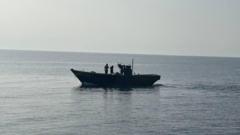In a significant diplomatic move, South Korea has returned six North Koreans who accidentally entered its waters earlier this year, expressing a strong desire to return home. According to Seoul's Ministry of Unification, these individuals consisted of two North Koreans who drifted south in March and stayed for four months—a record for non-defectors—and four sailors who crossed a disputed maritime border in May. This operation marks the first repatriation under President Lee Jae-myung, who was elected with a promise of improved ties with the North, although previous attempts at coordination were hindered for months.
Historically, North Koreans who unintentionally drift into South Korea are sent back via land borders, a process complicated by the severed communication lines since April 2023 and North Korean leader Kim Jong Un's declaration that unification was unattainable. Seoul had made attempts to notify the North of the repatriation through the UN Command, but responses were absent, leading to speculation that an unspoken agreement existed regarding the handover, as North Korean vessels were sighted nearby during the event.
Analysts caution that the six repatriated individuals are likely to face extensive interrogation upon their return, as North Korean authorities typically scrutinize such cases for potential security breaches. Experts suggest their return may serve the Kim regime's narrative by reinforcing its legitimacy, despite problematic implications for those who had glimpsed life outside the isolated state.
Activism among North Korean defectors has raised concerns, as voices like Lee Min-bok argue that the repatriated individuals should have been afforded the opportunity to learn from defectors in South Korea, which could have shifted their perspective on returning. In contrast, the current South Korean administration appears to be curbing such engagement, with discussions underway to limit defector outreach initiatives.
Despite President Lee's promises to rekindle dialogue and mitigate tensions, experts remain skeptical about sustainable improvements in relations. North Korea's growing alliances with Russia and diminishing public inclination for engagement in the South suggest a continuation of strained ties, limiting prospects for renewed communication or cooperation between the two Koreas.
Historically, North Koreans who unintentionally drift into South Korea are sent back via land borders, a process complicated by the severed communication lines since April 2023 and North Korean leader Kim Jong Un's declaration that unification was unattainable. Seoul had made attempts to notify the North of the repatriation through the UN Command, but responses were absent, leading to speculation that an unspoken agreement existed regarding the handover, as North Korean vessels were sighted nearby during the event.
Analysts caution that the six repatriated individuals are likely to face extensive interrogation upon their return, as North Korean authorities typically scrutinize such cases for potential security breaches. Experts suggest their return may serve the Kim regime's narrative by reinforcing its legitimacy, despite problematic implications for those who had glimpsed life outside the isolated state.
Activism among North Korean defectors has raised concerns, as voices like Lee Min-bok argue that the repatriated individuals should have been afforded the opportunity to learn from defectors in South Korea, which could have shifted their perspective on returning. In contrast, the current South Korean administration appears to be curbing such engagement, with discussions underway to limit defector outreach initiatives.
Despite President Lee's promises to rekindle dialogue and mitigate tensions, experts remain skeptical about sustainable improvements in relations. North Korea's growing alliances with Russia and diminishing public inclination for engagement in the South suggest a continuation of strained ties, limiting prospects for renewed communication or cooperation between the two Koreas.




















